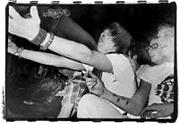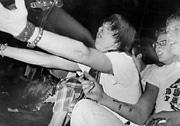DO CLUBS THAT DRAW black customers cause more problems than other types of clubs? Or do they just attract more unfavorable attention from city governments and police? These questions might be posed to the Washington State Liquor Control Board this year.
Since the “added activities” ordinance that regulated the music format in a club was deemed unconstitutional last year, some cities, including Seattle, have tried out a new tactic: asking the Liquor Control Board not to renew certain liquor licenses. Without the licenses clubs cannot serve liquor and making a profit becomes nearly impossible. Some see a pattern in the requests based on music formats and customer base.
“This year we’re having more requests for nonrenewal of licenses,” noted Chuck Dalrymple, the Liquor Control Board agent who supervises licensing. “There were 10 this year, whereas usually we get two or three.”
Many of the requests for nonrenewal are based on supposed problems caused by the club’s patrons. But David Osgood, the crusading lawyer who fought to get the “added activities” law thrown out, says the most criminal thing some of the clubs have been doing is drawing crowds of young African Americans.
Southern Comfort, in Lakewood near Tacoma, is one restaurant threatened with losing its liquor license. It’s a small joint with a maximum capacity of 150 that on Fridays and Saturdays hosts a DJ who usually plays a mix of rap styles, according to owner Dixie Shaw. Until recently, Shaw hired off-duty Lakewood police officers for security on those nights.
Business dropped dramatically after an April 14 shooting death in the club and Shaw said her relationship with the city then changed. She requested meetings with city officials and police to smooth things over and on May 10 met with City Attorney Daniel Heid and Assistant Police Chief Rick Adamson. The meeting went badly, Shaw claims.
Shaw described Heid’s and Adamson’s attitude as hostile and condescending and believes that police exaggerated the problems caused by the bar because most of its customers are black.
“I guess after so many years I shouldn’t have been so naive,” says Shaw, who ironically works as a civil rights investigator for King County. “I don’t play the race card lightly. I’m trained to evaluate the evidence and I think it’s a cop-out to claim racism [all the time]. [But] the city of Lakewood’s own language is a racial stereotype.”
The police initially demanded that Shaw hire two off-duty police officers every night, despite the fact Shaw said she was barely drawing 30 customers a night.
In a June 21 letter to Shaw, the city amended their position and required off-duty police only for Fridays and Saturdays after the police concluded that the shooting was not a product of the restaurant’s music format, but an intended attack on a specific victim. But the letter also stated: “We anticipate that you will comply with your stated intentions of modifying your music format in order to avoid or at least reduce any incidents of music which encourages or promotes violence or other inappropriate behavior.”
Lakewood Police Chief Larry Saunders said police are not concerned with the type of music the restaurant plays, but with “the repeated series of criminal activity in the area.” Saunders says 108 calls to 911 emanated from the bar in 1999.
Osgood is not surprised Southern Comfort has a high number of 911 calls.
“This is a pattern that’s been going on in Seattle for years. You target a club and tell them to dial 911 if anyone looks at you funny. You think you are helping, but actually you are helping the police make a case against you,” says Osgood.
On June 27 the city of Lakewood sent a letter to the Liquor Board asking them not to renew Southern Comfort’s liquor license because of violent activity on and around the restaurant: “Unfortunately the music that the establishment has used, or at least periodically used, is what has been described by police as ‘gangster rap’ which seems to encourage a clientele more prone to problem conduct.”
Shaw and her restaurant partner who calls himself Smitty say they never referred to their music as gangster rap. Smitty says at the May 10 meeting he tried to explain to Heid and Adamson about rap styles and said the club tried to stayed away from rap artists who use a lot of swearing and violent lyrics.
They are protesting the city’s position and had a hearing scheduled with the Liquor Board earlier this week.
AT LEAST SOUTHERN COMFORT is getting its public hearing. Caf頁rizona, a hip-hop dance club in Federal Way, simply got a letter on November 16 stating that their liquor license would not be renewed due to charges by the city that the club generates a high percentage of 911 calls, disrupts the neighbors’ businesses, and had 34 customers accused of DUIs last year. Caf頁rizona was never given an initial public hearing to dispute the city’s charges.
“Before the board accepted these [charges], they should have had a hearing,” says Ken Kagen, Caf頁rizona’s lawyer.
Kagen claims the city has had it in for Caf頁rizona since the club opened. Back in 1995 the city asked the board not to renew their liquor license based on a fire code violation. An unusual request, says Kagen, considering the city had never brought the violation to the club’s attention.
Interim City Attorney Bob Sterbank says Caf頁rizona is a problem nightspot. “The problem with their operation is that it results in fights, thefts, DUIs. They have a horrible impact on the surrounding businesses. Denny’s, Arco, BP are all saying to the city they have to close down early because of the problems caused by the patrons of Caf頁rizona.”
Sterbank claims that in 1999 Caf頁rizona had 72 DUIs attributed to it and that the issue is not the color of the patrons, but their disruptive activities. While he admits the city has limited documentation of Caf頁rizona overserving its customers, he claims the after-hours activity leaves the city to conclude overserving is occurring.
Club manager John Chong says he believes all of the city’s statistics were skewered to cast Caf頁rizona in a bad light because their clientele is primarily black. The club has only one warning on record from the Liquor Board, he claims.
“Last year we had 31 DUIs,” Chong admits. But he complains, “[the police] assume if they are black then they got drunk here.”
He said the Federal Way police department attributes all the nearby responding 911 calls to Caf頁rizona, whether the call is responding to a neighboring business or a nearby parking lot. “They call all our customers one word, ‘criminal,'” he says.
Chong has appealed the decision and the hearing will be heard in front of a judge throughout this week and next. The Liquor Board will review the findings and make a final decision in September.
BUT IF SOUTHERN COMFORT and Caf頁rizona are fighting for their music, one Seattle restaurant, China Harbor located on Westlake Ave., would rather change formats.
“Our restaurant doesn’t have enough money to hire a lawyer,” said restaurant manager Tony Yang. According to Yang, for several months the restaurant had been letting a promoter host an R&B DJ on Friday nights. The neighbors complained about the noise and trash left behind, but Yang thought the complaints stemmed mostly from the young crowds of African Americans who were attracted to the restaurant.
Julie Martin, who lives in a neighboring condo, said the crowd she has spotted hanging out in China Harbor’s parking lot was a diverse group. The issue is not that they are any color, or play a certain type of music, but the noise they and the club creates. People sitting in their cars in the parking lot with their stereos turned up have disturbed her.
“I’ve talked to people who have had meetings with China Harbor and the problems decline, but in a month they are back at it,” says Martin.
Martin and other neighbors, including some houseboat owners who reside behind the club, worked with the city and created a “Good Neighborhood Agreement” that would help control the problem. Martin says they will take the restaurant to court if it does not sign the agreement. They have not yet heard back from the restaurant.
The city of Seattle also tried, unsuccessfully, to get the Liquor Board not to renew China Harbor’s liquor license.
Yang points out that except for one warning they have a clean record from the Liquor Board. He also argues that due to the club’s location on Westlake, an area that also has a public park nearby, people should expect some noise. However, he did say that instead of fighting the issue, China Harbor will probably host its last R&B night on Aug 25.
“It seems like the city of Seattle does not like black music,” he concludes.






